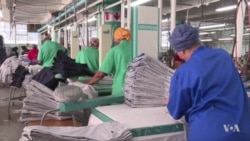It could soon be cheaper to operate a factory of robots in the United States than employing manual labor in Africa. That’s the stark conclusion of a report from a London-based research institute, which warns that automation could have a devastating effect on developing economies unless governments invest urgently in digitalization and skills training.
The rhythmic sounds of the factory floor. At this textile plant in Rwanda, hundreds of workers sit side-by-side at sewing machines, churning out clothes that will be sold in stores across the world.
Outsourcing production by using cheap labor in the developing world has been a hallmark of the global economy for decades. But technology could be about to turn that on its head.
Research from the Overseas Development Institute focused on the example of furniture manufacturing in Africa. Karishma Banga co-authored the report.
"In the next 15 to 20 years, robots in the U.S. are actually going to become much cheaper than Kenyan labor. Particularly in the furniture manufacturing industry. So this means that around 2033, American companies will find it much more profitable to reshore production back. Which means essentially get all the jobs and production back from the developing countries to the U.S. And that obviously can have very significantly negative effects for jobs in Africa."
As robots are getting cheaper, she says, people are getting more expensive.
"So the cost of a robot or the cost of a 3D printer, they’re declining at similar levels, around 6 percent annually. So that’s a significant decline. Whereas wages in developing countries are rising."
There’s no doubting the challenges posed by automation to manual labor in developing countries – but some are fighting back.
The Funkidz furniture factory in Kenya breaks with the traditional mold of production. Automated saws cut perfect templates using computer-aided designs, overseen by skilled programmers and operators.
The investment is paying off, with rapid growth and expansion into Uganda and Rwanda. But Kenyan CEO Ciiru Waweru Waithaka says she can’t find the right employees.
"We have machines that sit idle because we don't have skilled people. There are many people who need jobs, yes, we agree, but if they have no skills… I would love to employ you, but you need a skill, otherwise you cannot operate our machines. So we are urging all institutions, government, please let us take this skills gap as a crisis."
That call is echoed by the ODI report authors – who urge African governments to use the current window of opportunity to build industrial capabilities and digital skills - before the jobs crunch hits.





